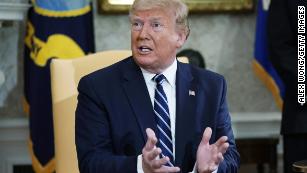Jared Kushner's peace plan is dead on arrival

By Peter Bergen, CNN National Security Analyst
Updated 7:35 AM ET, Mon June 24, 2019
Peter Bergen is CNN's national security analyst, a vice president at New America and professor at the School of Politics and Global Studies at Arizona State University. He is the author of "United States of Jihad: Investigating America's Homegrown Terrorists." View more opinion articles at CNN.
(CNN)In 2007, Jared Kushner's family company purchased 666 Fifth Avenue, a Manhattan office building, for a then-record $1.8 billion at the height of the real estate boom. It was widely regarded as one of the worst deals in Manhattan real estate history, since Kushner could never secure enough tenants to cover his mortgage payments.

Now Kushner has moved onto much bigger deals -- a peace agreement between the Israelis and the Palestinians.
Except it's all a lot more complex than the world of Manhattan real estate. The deal that Kushner is now offering the Palestinians makes his disastrous Fifth Avenue purchase look like the Dutch purchase of Manhattan from the Indians in 1626 -- for the equivalent of not much more than $100.
That's because Kushner is offering the Palestinians bupkis as his opening bid. You read that right. Kushner's opening bid for one of the most important real estate deals in the 21st century is: Palestinians, you get nothing.
Yes, Kushner's economic plan for the Palestinians, announced on Saturday, is $50 billion of investment. But no country, including the United States, has actually put a dime of that money on the table.
Talk about a leveraged real estate investment! This is like Kushner's father-in-law's real estate play where investors paid him to put the Trump name on a building, while he put up no money up himself.
And as far as we can discern from reports about what else might be in the tightly held Kushner plan, there is no plan for an actual Palestinian state nor for the return of any Palestinian lands annexed by the Israelis. In fact, quite the reverse -- the plan will likely try to codify Israel's annexations of Palestinian territory.
Just imagine if the British in 1947 had told Jewish leaders in Palestine (now modern-day Israel), "We have a really great deal for you: We will offer you a lot of nonexistent investment, and we will also prevent you from gaining your own state." How would the Jewish leadership have then reacted?
Kushner and his negotiating team seem to have internalized the Israeli positions that there are no credible partners on the Palestinian side to deal with, whether it's the Palestinian Authority or Hamas. Meanwhile, Hamas and Islamic Jihad continue to fire rockets indiscriminately into Israel, challenging the very notion that peace negotiations are feasible at this time.
Unsurprisingly, the Palestinians are boycotting the much-ballyhooed Palestinian investment conference that Kushner is hosting this week in Bahrain.
Palestinian Munib al Masri, a billionaire industrialist, told the Washington Post that he promptly rejected an invitation to the conference because, "Our problem is a political one, not an economic one. We have dignity, we have leadership, and they don't want to go because they believe America is not an honest broker."
In other words, Kushner's peace plan is predictably dead on arrival -- though the collapse of any real peace deal has been a work in progress since the beginning of the Trump administration.
First, Trump appointed his bankruptcy lawyer, David Friedman, to serve as US ambassador in Israel. After his nomination was announced, Friedman said he looked forward to moving the US embassy from Tel Aviv to "Israel's eternal capital, Jerusalem."
But Palestinians also regard Jerusalem as their capital, while Muslims at large look upon it as a sacred city -- since the Prophet Mohammed was supposed to have ascended into heaven from the al-Aqsa mosque in East Jerusalem. And this was, in large part, the reason that the United States embassy had remained in Tel Aviv.
Friedman's rhetoric doesn't help matters. An ultra-Zionist, he has called supporters of the progressive Jewish group J Street "worse than kapos" for supporting a two-state solution. For reference, kapos were the Jews in Nazi concentration camps who guarded other prisoners.
Friedman also said this month that the Trump administration could support Israel if it annexed parts of the West Bank.
On May 15, 2018, Friedman -- together with Kushner and his wife Ivanka Trump -- opened the new US embassy in Jerusalem alongside the buoyant Israeli Prime Minister Benjamin Netanyahu, who was so close to the Kushner family that he had once slept in Jared Kushner's childhood bedroom in New Jersey.
Kushner declared, "Peace is within reach." While the Kushners were celebrating peace, only 50 miles away, Israeli forces in Gaza were simultaneously killing scores of Palestinians who were protesting the opening of the US embassy in Jerusalem. (Israel said it was responding to what it called terror attacks.)
After the embassy move, Palestinian Authority President Mahmoud Abbas declared that Kushner and his negotiating team, which includes Friedman, could no longer be considered honest brokers.
But the Trump administration kept driving stakes into the heart of the Kushner peace plan with punitive measures against the Palestinians -- such as defunding the United Nations Relief and Works Agency that educates and feeds millions of displaced Palestinians. It also closed an office that represented Palestinian interests in Washington, DC.
Palestinian officials stopped meeting with Kushner. What was the point?
King Salman, the Saudi monarch, repeatedly condemned the US embassy move to Jerusalem. The Saudi monarchy has awarded itself the title, "Custodian of the Holy Places." It is a title that the Saudis take seriously, and there is no way they are going to play along with Kushner's peace plan if the Trump administration seems intent on ceding the holy city of Jerusalem to the Israelis.
The fantasy that the Saudis could bribe or strong-arm the Palestinians to accept a Kushner-constructed peace agreement is now officially dead.
A further confirmation that Kushner's peace plan has no chance of success came after an election in Israel on April 9, 2019, after which Netanyahu was unable to form a coalition government and had to call for new elections to be held in September.
It was inconceivable that Kushner or Trump would put forward any peace plan that required even the most minimal of concessions from the Israelis during an election season when their key foreign policy goal was the maintenance in power of the right-wing government of Netanyahu, which has not the slightest interest in moving forward on any plan that gives the Palestinians anything even approximating their own state.
Trump's Middle East envoy, Jason Greenblatt, said this month that the Trump administration will likely push back the announcement of the overall peace plan until November.
If you believe that Kushner is going to facilitate a peace agreement at the Bahrain conference or at any time in the foreseeable future, I have a truly great deal on an office building at 666 Fifth Avenue that I can broker for you.




